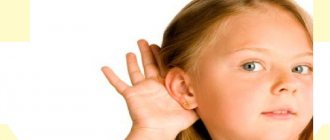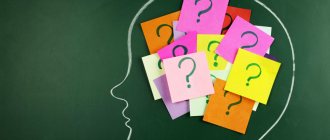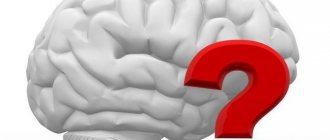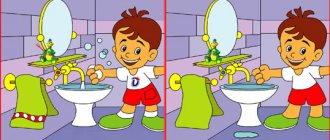What is auditory memory
Auditory memory is understood as a person’s ability to remember a certain order of sounds and then reproduce it.
Short-term auditory memory is a type of memory through which an individual understands the meaning of what was said and quickly processes the information received.
The received sound information moves from the phonetic to the semantic area, which is already associated with long-term memory (here the information is stored either for several minutes or for a long time).
In modern scientific literature, auditory-verbal memory is considered as one of the most important higher mental functions, as an intravital, socially determined, speech-mediated process (L.S. Vygotsky) [2].
L.S. Tsvetkova in her works proved that auditory-verbal memory is ensured by the work of 21 and 37 tertiary cortical fields of the middle temporal gyrus of the left hemisphere dominant for speech. The symmetrical area of the right hemisphere is responsible for remembering and reproducing non-word visual and auditory stimuli. Each type of memory is based on three processes - remembering, storing and reproducing. On their basis, neuropsychological mechanisms of any type of memory, including auditory-verbal, are realized [10].
Research by E.G. Simernitskaya showed that with lesions of the left hemisphere in children, a central place in the structure of the observed disorders is occupied by a narrowing of the volume of auditory-verbal memory. With lesions of the right hemisphere, the symptom of impaired reproduction of a given order of elements comes first. In case of lesions of the diencephalic region, the central place is occupied by the symptom of pathological inhibition of traces under conditions of interference [8].
According to the results of the study by Yu.V. Mikaze, two types of developmental deviations were identified, characterizing a lag in the development of mental functions. The first of them is associated with a lag in the development of the auditory-speech sphere. Based on the results of an examination of children with reduced auditory-verbal memory, parameters were identified that were associated with the largest number of errors during testing [4].
In order of severity and frequency of occurrence in different age groups, they were:
- volume of short-term auditory-verbal memory;
- inhibition of auditory verbal traces (words), which indicates the processes of forgetting the memorized verbal material;
- order of auditory-verbal traces;
- involuntary auditory-verbal memorization;
- strength of auditory-verbal traces (words), which characterizes long-term auditory-verbal memory;
- regulation of auditory-speech traces.
Excesses of parameter values (compared to normative ones) in visual and motor memory are not as pronounced as in auditory-verbal memory.
Impaired auditory-verbal memory leads to children’s insufficient understanding of addressed speech and verbal instructions, complicates the child’s communication with adults and peers and, as a result, causes difficulties in the formation of communication skills.
Children with general speech underdevelopment have more serious deficiencies in the development of auditory-verbal memory, in whom almost all aspects of speech are impaired: vocabulary, grammar, syllable structure, sound pronunciation. When working with children with general speech underdevelopment, it is necessary not only to overcome difficulties in mastering lexico-grammatical and phonemic skills, but also to adjust the processes of formation of the psychological basis of speech, including long-term and operational memory, the ability to concentrate and distribute attention, and cognitive processes.
12 children (7 boys and 5 girls) aged 6 years took part in the ascertaining experiment. The research group consisted of children with level III of speech development who have underdevelopment in the lexical-grammatical and phonetic-phonemic areas. The study was conducted on the basis of the State Educational Institution "Aleksin School of Aleksin".
Based on the selected indicators, age characteristics and specifics of the disorder, a diagnostic program was selected to study auditory-verbal memory in children of senior preschool age with general speech underdevelopment. During the diagnostic process, such parameters of the development of auditory-verbal memory were studied as: the level of development of auditory-verbal memory: memorization and delayed reproduction (method “Learning 10 words” by A.R. Luria), the volume of short-term auditory-verbal memory (method “Remember the numbers” by R.S. Nemov ), the strength of auditory-verbal traces (words) (method “Remember a Pair” by M.W. Calkins), the order of auditory-verbal traces (method “Reproduction of a story” by A.R. Luria).
After analyzing the diagnostic results, we obtained the following results.
Analysis of the level of development of auditory-verbal memory (memorization and delayed reproduction using the “Learning 10 words” method (A.R. Luria)) showed: in the majority of children in the study group, the level of auditory-verbal memory is at a level below the age norm; the majority of children, after the last reproduction of words, showed low result, respectively, delayed reproduction in most children is below the age norm. It was also found that in 4 children, auditory-verbal memory corresponds to the age norm.
According to the “Remember the Numbers” method (R.S. Nemov), when studying the volume of short-term auditory-verbal memory, in the majority of children in the study group (70%), the volume of auditory-verbal memory has a low level of development, which indicates memorization of insignificant quantitative information. In 30% of children, the volume of auditory-verbal memory has an average level of development, which may indicate that children do not remember all the material presented.
When studying the level of strength of auditory-verbal traces (words) using the “Remember a Pair” method (M.U. Calkins), it was found that in 60% of children in the study group, the level of strength of auditory-verbal traces (words) has a low level of development; the arbitrariness of mental processes is also poorly developed, insufficiency formation of memorization techniques. 40% of children have an average level of strength of auditory-verbal traces (words).
The results of studying the level of development of the order of auditory-verbal traces (words) using the “Story Reproduction” method (A.R. Luria) showed that the majority of children in the study group (60%) had a low level of development of the order of auditory-verbal traces (words), which may be the result of their existing speech disorders, many children found it difficult to establish cause-and-effect relationships when reproducing the story. They needed a lot of help and guiding questions. 40% of children have an average level of development of the order of auditory verbal traces (words).
Thus, the results of our diagnostic study revealed a predominantly low level of auditory-verbal memory in children of senior preschool age with general speech underdevelopment. Based on these results, correctional and developmental measures were developed aimed at correcting the auditory-verbal memory of older preschool children with general speech underdevelopment.
When drawing up a plan of correctional and developmental measures, developments from the following teaching aids and books were used: A.F. Anufriev, S.N. Kostromina “How to overcome difficulties in teaching children. Psychodiagnostic tables. Psychodiagnostic techniques. Corrective exercises” [1], A.A. Osipova “General psychocorrection. Textbook" [6], T.B. Filicheva, G.V. Chirkina, Tumanova T.V. “Programs of compensatory preschool educational institutions for children with speech disorders” [9], A.V. Semenovich “Neuropsychological diagnostics and correction in childhood” [7], N.N. Bal, N.V. Drozdova “Development of cognitive activity of preschool children with general speech underdevelopment in remedial classes. A manual for teachers of educational institutions implementing an educational program of special education at the level of preschool education” [2], T.P. Tryasorukova “Mnemosimulator. Development of auditory-verbal memory" [10].
The goal of correctional and developmental work is the development of auditory-verbal memory in children of senior preschool age with general speech impairment.
The tasks that specify the goals of correctional and developmental work are the following: increase the volume of auditory-verbal memory; develop the dynamics of memorizing speech material; develop children's memory through play activities; develop memorization techniques; increase the level of development of semantic memory.
Corrective activities include different types of games and exercises that fulfill all the assigned tasks.
The result of the implementation of these activities should be the development of auditory-verbal memory in older preschool children with general speech underdevelopment.
Auditory Memory Testing
To determine how developed a child’s auditory memory is, the David Weskler test is used:
- The child repeats a series of numbers in exact sequence: 5, 7, 1; 8, 2, 4, 2; 6, 9, 5, 7, 3.
- The child must name the numbers in reverse order: 2, 4; 4, 7, 8; 5, 9, 3, 6.
- The preschooler must repeat the words in the correct order; meadow, mole, night, cat, onion, whale, borscht, table, brushwood, letter, watermelon.
You can repeat numbers and words several times until the child remembers them and repeats them. But if even after 6-7 repetitions he was unable to remember and voice them, then it is necessary to seek advice from a neurologist
Auditory memory: what it is and how to develop it
Auditory memory helps a person remember and reproduce sequences of sounds. If you tell an auditory story a story, a real movie will form in his head, which he can easily retell. During lessons, an auditory learner easily remembers information and retells it without looking at textbooks or a notebook. At school, auditory memory is a child’s irreplaceable friend and helps to write summaries, essays, dictations, and remember important dates. There are not many people with 100% auditory memory, only 5-7%. It is impossible to artificially make oneself an auditory learner, but everyone can develop auditory memory skills.
How to understand how developed auditory memory is?
It is not necessary to contact a specialist to understand how developed a child’s auditory memory is. To do this, you can use standard tests that are easy to find on the Internet. One of the most common tests for auditory memory is the “Memorizing 10 Words” method according to A.L. Luria. The test is suitable for children aged 5 years and older. The essence of testing: invite your child to listen to 10 words that are unrelated to each other in meaning. The words should be simple and familiar to the child, for example: table, cat, tree, etc. After this, the child’s task is to pronounce the words that he remembers; the sequence is not important. The process is repeated 3 times, and the 4th time after 10-15 minutes. According to the norms, the first time the child should repeat 4-6 words. On repetitions 2 and 3, the child must speak at least 1 word more than on the previous attempt. The second and third repetitions show the child’s speed of memorization and perseverance. The fourth repetition can be done after 10 minutes - it shows the level of development of long-term memory. Normally, a child will repeat 2 words more or less than his best result. An adult normally remembers 7-9 words the first time. For a child, the norm is considered to be the number of words equal to his age plus/minus one. This means that for children 5-6 years old the norm is 4-6 words; for 6-7 years old - 5-7 words; from 8 years and older 7 or more words.
Games for the development of auditory memory.
When working to improve auditory memory, a child needs adult help. Exercises in the form of a game help to avoid stress and achieve better results.
1. Game "10 pairs". The essence of the game is that an adult comes up with 10 pairs of words related in meaning, reads them to the child with expression and slowly. After reading, the parent says the first word from the pair, and the child must remember and name the pair. Example of a game: cat - tail, hat - scarf, snow - frost, bear - den, thread - needle, table - chair, notebook - pencil, book - bookmark, chair - sofa, steering wheel - car. The game trains auditory memory and improves the child's attentiveness.
2. Game “Remember and continue” . The game not only improves auditory memory, but also increases its volume. The essence of the game: the adult begins the sentence, the child repeats it and adds his own detail. Depending on the number of participants, the game has 2 options. Option 1. If there are many children with you: An adult says, for example, “Today I walked through the forest and saw...”, the child, “Today I walked through the forest and saw a small mushroom...”, the third player repeats and adds his own. A player who makes a mistake leaves the game. The last one standing wins. Option 2. If there are few players: the principle of the game remains the same, but with each move not one or two words are added to the story, but many words and details. For example: “The boy went to visit his grandmother in the village...”, the second player repeats and adds “there he swam a lot and went into the forest.” The game continues until the first player knocked down. The one who gets lost is the one who loses. The game stimulates auditory memory, imagination and improves concentration.
3. Game “Listen and Draw” . The game comprehensively develops auditory memory, imagination and fine motor skills. An adult reads a poem or a short story to a child. It is important to read slowly and with intonation. The child’s task is to draw on paper those images from the work that he remembers more vividly than others. In the future, the child can retell the fairy tale based on the drawings. Take your favorite children's authors: Agnia Barto, Samuil Marshak, Vladimir Suteev.
4. Game “What was that?” For this game you will need recordings of natural phenomena, everyday sounds, musical instruments - any unusual sounds. Approach the matter with imagination. Play the recording for your child and ask him to guess what exactly he hears. When the child guesses, you can ask him to repeat the sound. Choose unusual sounds: the sound of the sea, the noise of a trolleybus, the crackling of a fire, the crunch of breaking sticks underfoot in the forest - the more unusual the sound, the more interesting it is to guess and try to repeat.
The main thing in the development of auditory memory is consistency. Regular exercise for 3-5 minutes a day will bring more benefits than exercise for 30 minutes, but once a week. Auditory memory does not develop alone. Any development will be complex. By developing thinking and attention, you also work on memory.
On the Razumeikin website you will find educational game tasks for memory, thinking, and logic.
Exercises to develop auditory memory
Every person has auditory memory, but it is developed differently. You can improve it with the help of exercises that need to be repeated regularly.
Ways to develop auditory memory through exercises:
- Repeat the series of numbers in the correct order. At the beginning they consist of 2 numbers, then - of 5-6. You can make the task more difficult by asking them to repeat the numbers in reverse order.
- Play music. Listen to it, then turn it off and repeat its rhythm by clapping your hands.
- Writing texts from dictation also develops auditory memory.
- It is useful to be in solitude; for this you need to turn off the TV and radio. Sit down, close your eyes and listen carefully to the sounds around you, for example: the noise of the street. You can also do this exercise in the fresh air, listening to the sounds of nature.
- Repeat the clapping rhythm, which gradually becomes more difficult.
- Read a short passage of text, then retell it in your own words.
- Listening to radio programs, especially plays, and audio books trains auditory memory well. By analyzing and repeating individual passages, you can additionally train your memory and attention.
- Tongue twisters, tongue twisters, nursery rhymes, and poems of varying lengths train auditory memory.
- Determine by ear what musical instrument sounds.










